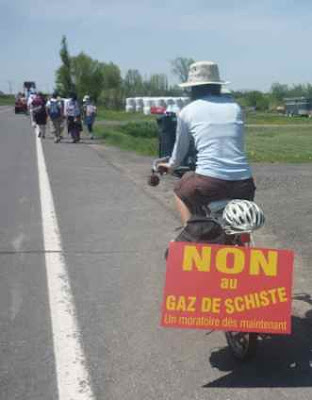Bicycle gardening has made its official return for 2011, in a totally primped up green vehicle including tufts of wheat on the fender and handlebars, as well as a classic spinning garden in the center of the wheel. After bicycle gardening took first place in the chef category of Earth Day Canada's How did you do that? contest, mobile microgreens were certainly bound for a second run this summer.
Differences from last year's experiments in bicycle gardening? This time, I grew the gardens on my socks. My old socks. Under my bed.
Last year when bicycle gardening was first developed, my bike and I lived alongside each other day and night, so I was able to water 15 times a day and let the garden grow slowly over the course of a 1000km ride. This year, the garden was serving purely as fleeting greenery and snackfood on a two day walk to protest shale gas exploration. Growing the garden on my bike in advance would have been a hassle, as the gardens require *very* frequent watering when left in direct sunlight. And so the "instant bike garden" was born, grown indoors in low-maintenance conditions, and then slipped onto the bike when the time is right.
Enter my socks. My old socks with holes in them. What is to be done with old organic socks that are 90% intact, but 10% not intact in inconvenient places like the heel and toe? Call me a hoarder for keeping broken socks in my closet, though something told me that they would eventually have a curious second life. And indeed, socks proved to be a perfect reclaimed medium for growing extreme gardens. Over a dozen people helped me eat the wheatgrass on the road, and few seemed bothered about its (clean)sock origins. A new era of sock gardening begins... (a recipe to grow your own is included at the end of this post).
The bicycle has also been my main tool of transportation this spring for gardening in the city with our neighborhood urban ecology collective. I've been transporting straw, compost, dirt, sand and edible perennials with this radical set of wheels. My  fender sticker that reads "One Less Car" is now becoming outdated. Time to upgrade to "One Less Truck".
fender sticker that reads "One Less Car" is now becoming outdated. Time to upgrade to "One Less Truck".
 fender sticker that reads "One Less Car" is now becoming outdated. Time to upgrade to "One Less Truck".
fender sticker that reads "One Less Car" is now becoming outdated. Time to upgrade to "One Less Truck".The biggest challenge? Wet compost. Like 15 bags of it. What would normally be called "an ever-so-slight incline, almost imperceptible" was now viewed as an "insurmountable hill" that required the aid of random passersby in order to reach the top. The second-biggest challenge? My back wheel starting to detach after surmounting the slight incline. One thing I've learned: stare at your bike and scratch your head, and help will come. Hail the good deeds of friendly strangers in the successful completion of yet another bicycle gardening exploit!
Organically yours,
Meghan

Unintentional colour coordination on a wet compost expedition.
Note the second compost trailer hiding in the background.
To clarify, when I say *instant*, I really mean six to ten days... the *instant* part is when you transfer it onto the bike.
As an alternative to old socks, try the same technique with reclaimed jute coffee bags, as used here in an instant horn-grass garden.
-Soak wheat kernels for 8 hours. Drain and rinse. Optionally, you can pre-sprout them in a jar for a day as they form their initial roots.
-Take an old sock, wet it, and stick in on a plastic tray or in a reclaimed plastic container.
-Put the wheat kernels on the sock. Spray the wheat kernels with a spray bottle.
-Put it under your bed or in a cupboard, as the darkness will compel the plants to develop their root systems.
-At least twice a day (preferably more), spray a little with a spray bottle. The goal here is making sure the wheat kernels don't dry out, but not sooo wet that mold forms.
-When the wheat forms its root system and has young plant shoots that are an inch or two long, transfer it to the sunlight. Keep spraying regularily with a spray bottle.
-When it's green and bushy, attach it to your bike (or anywhere else) using the metal from twist-ties. The root system of the wheat should have penetrated the fabric enough that the plants will naturally cling to the sock. Water very frequently if you want it to stay green and lively.
Special tips:
(1) Make sure there is enough air flow that mold doesn't develop.
(2) Consider sticking a plastic lid *inside* the sock before adding the wheat kernels, so the roots only go through part of the sock. When the wheat is done growing, remove the plastic lid, and you can slip the sock garden straight onto your mudguards.
(3) If you grow multiple gardens under your bed at the same time, do make sure that you remember to move *all* of them into the sunlight. Trust me, forgotten sock gardens are not the most pleasant surprise. Unless you're into that kind of thing.










